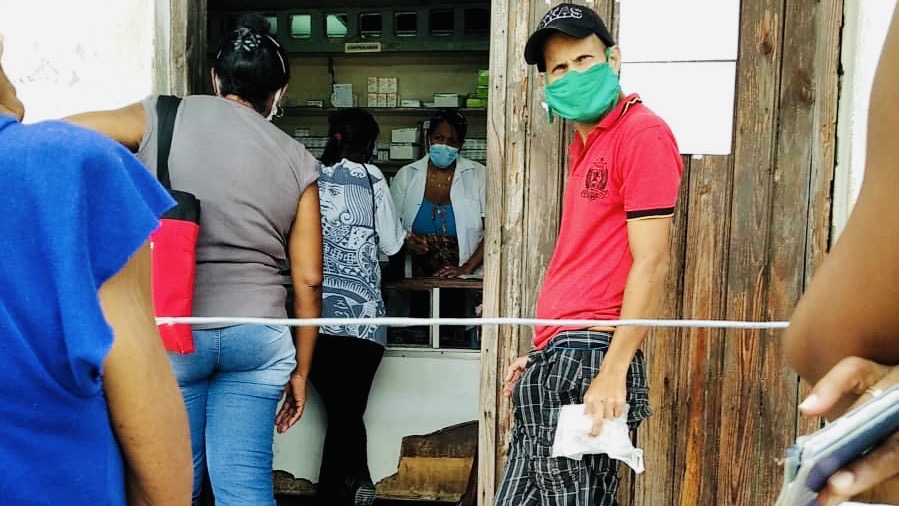The lines to buy medicines in Cuban pharmacies are as stressful and exhausting as those that form to buy chicken, oil, and basic groceries at the start of the month. The difference is that while those who wait in the latter vary in terms of age, sex and health, pharmacy clientele is usually made up of people who are very old, sick, or both.
On June 14, the second of the month's three shipments of medicines arrived at one of the pharmacies in the municipality of Habana del Este. As usual, the consignment was distributed the very next day.
"The line is not so long this time because many of the medicines that people need didn't arrive," said Ada María, a woman in her fifties, to a young man who was surprised because the group of people did not exceed 20.
Among the most popular drugs are those used to treat nerve diseases, pain, allergies, diabetes and hypertension. But this shipment did not include alprazolam, diazepam, or meprobamate, nor dipyrone, aspirin, captopril, atenolol or salbutamol sprays. Neither did any antibiotics or contraceptives of any kind arrive.
The lack of most of these medications forces people to improvise to alleviate their ailments. Some doctors are even daring to prescribe unorthodox treatments.
"I have a dead nerve in my knee. The pain I feel is very strong and, since there is nothing else, the neurologist prescribes amitriptyline," confessed Raquel, age 67.
Although the line was not that long, as few of the medications most people need had arrived, it was moving slowly. At 11:00 in the morning only 14 customers of the 50 who signed up had been attended to. As newcomers arrived, those in the line instructed them to use the "no-appointment line."
The appointment slips, small pieces of white paper with a number in blue ink, had not been handed out by the pharmacy staff, but rather by a regular customer, the kind who arrive in the early hours of the morning and then leave with a bag full of medicines.
The people in the line appreciated the slips, despite their unofficial nature and the fact that they had not been distributed by any authority, but rather by someone who took the opportunity to reserve advantageous numbers for their friends and acquaintances.
The cause of the extremely slow line was, in addition to the lethargy of the clerks, a survey that was being carried out.
"Two months ago we started requesting the identity card of the owner of each tarjetón. In addition, this time we are taking the information from the card and transferring it to a list to make sure that no one is buying medicines that they don’t need," a clerk explained.
The employees use up several pens filling out vouchers, stowage cards and other documents, to ensure that the "controlled" drugs actually reach their recipients. The days after each shipment arrives are extenuating for them. With a lot of work and little ventilation in the pharmacy, they are hungry and tired. They are consoled by the fact that the pharmacy is then empty the rest of the month.
For the clientele, the days of buying medicines are the worst. Although almost all are elderly and infirm, there are no seats or even acceptable conditions at the pharmacy given the long wait. Exposed to the sun, rain, cold, heat and boredom, many end up becoming totally insensitive.
"Just now a mother came with her child in her arms and the people in the line just wanted to kill her. They told her that she couldn’t buy anything with her child, because children were not supposed to leave home during the quarantine. Only one woman defended her, pointing out that there are no messengers, and that everything is a lie, because in most cases they don’t work," said another of the few young people present.
Another highlight of the day was the arrival of another mother accompanied by her teenage daughter, who suffered from a mental disability. According to her mother, the doctors had recommended that she not wait in line.
"We’re all sick here," "she’s a cheat who takes advantage," "why didn't you leave your daughter at home ...?” were some of the barbs hurled by those who had been waiting in line since the early morning.
At 2:00 in the afternoon they were completely exhausted, had not had lunch, and only the first 27 in the line had been helped, plus about nine cases of people with disabilities, one allowed to enter after every three customers waiting.
At that rate, "those without an appointment" would be buying their medications around 6:00 in the afternoon, almost at the pharmacy's closing time. If, after dedicating almost a full day to this task, they do not acquire the medicines they need because not enough have arrived in this shipment, they will have to return when the next one arrives and undertake, once again, the daunting task of acquiring medicines at a Cuban pharmacy.
